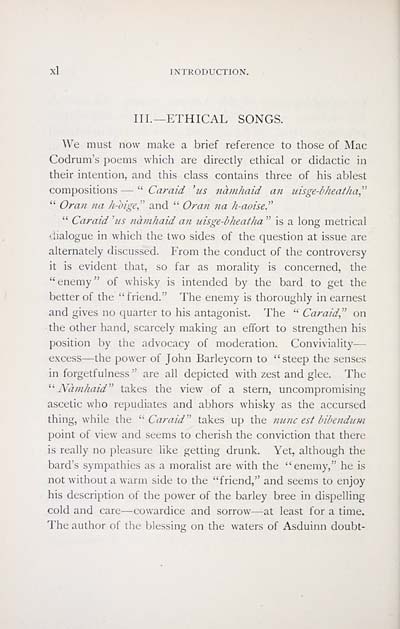Hew Morrison Collection > Poems and songs of John MacCodrum, Archibald MacDonald, and some of the minor Uist bards
(58)
Download files
Complete book:
Individual page:
Thumbnail gallery: Grid view | List view

INTRODUCTION.
III.— ETHICAL SONGS.
We must now make a brief reference to those of Mac
Codrum's poems which are directly ethical or didactic in
their intention, and this class contains three of his ablest
compositions — " Caraid 'us nàmhaid a?i nisge-l'heatha,'"
*' Oran na h-oige,'" and " Or an ?ta h-aoise."
" Caraid 'us tiàmhaid an uisge-bheatha " is a long metrical
dialogue in which the two sides of the question at issue are
alternately discussed. From the conduct of the controversy
it is evident that, so far as morality is concerned, the
"enemy" of whisky is intended by the bard to get the
better of the "friend." The enemy is thoroughly in earnest
and gives no quarter to his antagonist. The " Caraid," on
the other hand, scarcely making an effort to strengthen his
position by the advocacy of moderation. Conviviality —
excess — the power of John Barleycorn to "steep the senses
in forgetfulness " are all depicted with zest and glee. The
'■'■ Nàmhaid" takes the view of a stern, uncompromising
ascetic who repudiates and abhors whisky as the accursed
thing, while the ''Caraid" takes up the tiunc est bibendum
point of view and seems to cherish the conviction that there
is really no pleasure like getting drunk. Yet, although the
bard's sympathies as a morahst are with the "enemy," he is
not without a warm side to the "friend," and seems to enjoy
his description of the power of the barley bree in dispelling
cold and care — cowardice and sorrow — at least for a time.
The author of the blessing on the waters of Asduinn doubt-
III.— ETHICAL SONGS.
We must now make a brief reference to those of Mac
Codrum's poems which are directly ethical or didactic in
their intention, and this class contains three of his ablest
compositions — " Caraid 'us nàmhaid a?i nisge-l'heatha,'"
*' Oran na h-oige,'" and " Or an ?ta h-aoise."
" Caraid 'us tiàmhaid an uisge-bheatha " is a long metrical
dialogue in which the two sides of the question at issue are
alternately discussed. From the conduct of the controversy
it is evident that, so far as morality is concerned, the
"enemy" of whisky is intended by the bard to get the
better of the "friend." The enemy is thoroughly in earnest
and gives no quarter to his antagonist. The " Caraid," on
the other hand, scarcely making an effort to strengthen his
position by the advocacy of moderation. Conviviality —
excess — the power of John Barleycorn to "steep the senses
in forgetfulness " are all depicted with zest and glee. The
'■'■ Nàmhaid" takes the view of a stern, uncompromising
ascetic who repudiates and abhors whisky as the accursed
thing, while the ''Caraid" takes up the tiunc est bibendum
point of view and seems to cherish the conviction that there
is really no pleasure like getting drunk. Yet, although the
bard's sympathies as a morahst are with the "enemy," he is
not without a warm side to the "friend," and seems to enjoy
his description of the power of the barley bree in dispelling
cold and care — cowardice and sorrow — at least for a time.
The author of the blessing on the waters of Asduinn doubt-
Set display mode to: Large image | Transcription
Images and transcriptions on this page, including medium image downloads, may be used under the Creative Commons Attribution 4.0 International Licence unless otherwise stated. ![]()
| Early Gaelic Book Collections > Hew Morrison Collection > Poems and songs of John MacCodrum, Archibald MacDonald, and some of the minor Uist bards > (58) |
|---|
| Permanent URL | https://digital.nls.uk/81340459 |
|---|
| Description | A selection of items from a collection of 320 volumes and 30 pamphlets of literary and religious works in Scottish Gaelic. From the personal library of Hew Morrison, the first City Librarian of Edinburgh. |
|---|
| Description | Selected items from five 'Special and Named Printed Collections'. Includes books in Gaelic and other Celtic languages, works about the Gaels, their languages, literature, culture and history. |
|---|

